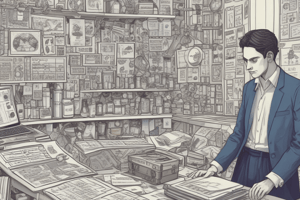Podcast
Questions and Answers
How do trade relationships, like that between the United States and China, generally affect the countries involved?
How do trade relationships, like that between the United States and China, generally affect the countries involved?
- Trade leads to a complete loss for one party.
- Both countries can improve their economic conditions. (correct)
- Trade does not significantly influence either country.
- One country significantly benefits while the other suffers.
What primarily replaces central planning in a market economy?
What primarily replaces central planning in a market economy?
- Economic theories and models.
- Random consumer choices.
- The government’s regulations and rules.
- The decisions by firms and households. (correct)
What is a 'market failure'?
What is a 'market failure'?
- Excessive government interference in markets.
- When market mechanisms do not yield an efficient allocation of resources. (correct)
- Successful outcomes of market operations.
- An situation where the market efficiently allocates resources.
What role does the government play in a market economy?
What role does the government play in a market economy?
What is an externality in economic terms?
What is an externality in economic terms?
What fundamentally determines a nation's standard of living?
What fundamentally determines a nation's standard of living?
What does the term 'economy' originate from?
What does the term 'economy' originate from?
Which of the following is NOT a cause of market failure?
Which of the following is NOT a cause of market failure?
What is a fundamental aspect of economics according to the content?
What is a fundamental aspect of economics according to the content?
Which principle indicates that making decisions requires trade-offs?
Which principle indicates that making decisions requires trade-offs?
How do prices in the marketplace influence buyers and sellers?
How do prices in the marketplace influence buyers and sellers?
What does the expression 'There ain’t no such thing as a free lunch' imply?
What does the expression 'There ain’t no such thing as a free lunch' imply?
What does the term 'marginal change' refer to in economics?
What does the term 'marginal change' refer to in economics?
Which principle suggests that people respond to incentives?
Which principle suggests that people respond to incentives?
What is one benefit of trade as per the discussed principles?
What is one benefit of trade as per the discussed principles?
How do rational people typically make decisions?
How do rational people typically make decisions?
What primarily determines the growth rate of a nation's average income?
What primarily determines the growth rate of a nation's average income?
What is a common cause of sustained inflation?
What is a common cause of sustained inflation?
What effect does increasing the quantity of money have in the short run?
What effect does increasing the quantity of money have in the short run?
During hyperinflation, how much can prices increase in a short period?
During hyperinflation, how much can prices increase in a short period?
How does increased hiring affect unemployment in the context of inflation?
How does increased hiring affect unemployment in the context of inflation?
What was the cost of a daily newspaper in Germany in January 1921?
What was the cost of a daily newspaper in Germany in January 1921?
The phenomenon of rising prices due to excessive money supply is known as what?
The phenomenon of rising prices due to excessive money supply is known as what?
What happens to firms' behavior in response to increased spending due to monetary injections?
What happens to firms' behavior in response to increased spending due to monetary injections?
Flashcards are hidden until you start studying
Study Notes
Economics: A Study of Scarcity and Choice
- The term "economy" originates from the Greek word "oikonomos," which translates to “one who manages a household.”
- Economics analyzes how a society manages scarce resources. Resource allocation is not controlled by a centralized authority; instead, it stems from the collective decisions of countless households and companies.
Principles of Economics
- People Face Trade-offs: To obtain desired things, we often need to give up others we also value. Decision-making involves balancing competing goals.
- The Cost of Something Is What You Give Up to Get It: Because individuals face trade-offs, decisions necessitate comparing the costs and benefits of alternative choices. The cost of an action isn’t always apparent and may involve opportunity costs.
- Rational People Think at the Margin: Economists generally assume individuals are rational, systematically making informed choices to achieve their goals. Rationality involves considering marginal changes, which are incremental adjustments to existing plans. By comparing marginal benefits and marginal costs, rational people optimize their decisions.
- People Respond to Incentives: Incentives—rewards or punishments—influence people’s actions. Rational individuals, motivated by costs and benefits, will respond accordingly to these incentives.
- Trade Can Make Everyone Better Off: Trade between countries isn't a zero-sum game where one side wins at the other's expense. Rather, it allows each country to specialize in what it does best and reap the benefits through greater efficiency and broader choices for consumers.
- Markets Are Usually a Good Way to Organize Economic Activity: Market economies rely on the decentralized decision-making of countless firms and households, guided by prices and self-interest. Buyers and sellers interact in markets, where prices function as signals for demand and supply.
- Governments Can Sometimes Improve Market Outcomes: Governments establish rules and institutions to ensure fair competition and protect property rights, crucial for market functioning.
Government's Role in the Economy
- Governments are often needed to address market failures: situations where the market alone fails to allocate resources efficiently.
- Market failures can arise from externalities, which are the unintended consequences of one person's actions on others.
- Market power, where an individual or group can control market prices, is another cause of market failure.
Productivity and Living Standards
- A nation’s standard of living is directly related to its ability to produce goods and services.
- The productivity—output per unit of labor input—of a country's workforce plays a significant role in its living standards. Higher productivity leads to higher living standards.
Inflation and Money Supply
- Inflation, a sustained rise in the general price level, is often driven by excessive money printing.
- When a government creates excessive amounts of money, its value declines, causing inflation.
Inflation and Unemployment
- In the short term, there is a potential trade-off between inflation and unemployment.
- Increasing the money supply stimulates spending, leading to higher demand for goods and services.
- This increased demand can drive up prices (inflation) but also increase employment and production in the short term.
Studying That Suits You
Use AI to generate personalized quizzes and flashcards to suit your learning preferences.




